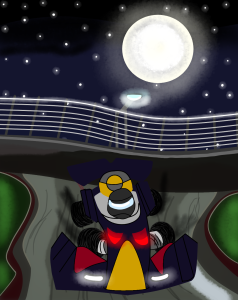Miller Compares Dual Credit English and AP Literature
Lisa Detweiler-Miler mysteriously reads book in the library. Miler believes that both AP Literature and Dual Credit English have benefits for students.
April 13, 2023
While this school year nears its end, students finalize their schedules for the next academic year. Specifically, future upperclassmen must decide between academic, dual-credit, and Advanced Placement (AP) courses. Many future seniors feel conflicted about dual credit English and AP Literature– the last English credit seniors need to graduate.
All dual credit classes are through Houston Community College, while the College Board provides all AP classes. Fortunately, dual credit English and AP Literature teacher Lisa Detweiler-Miller can clear up students’ confusion about the two courses’ similarities and differences. Firstly, dual credit English has a framework that teachers build their curriculum around; English 1301 and 1302 prepare students for the rigor of writing in their college careers.
“We start with the fundamentals of writing like a really basic assignment, and it escalates from there to what [students are] working on now, which is a full eight-to-ten-page research paper,” said Miller. “We learn different types of formatting. We also read different types of texts and research as tools for proving your points, being a good communicator and ultimately supporting your points.”
Although AP Literature centers on the AP exam in May, its most important goal is to share a love of literature. Therefore, the course primarily focuses on timeless literary texts (such as Heart of Darkness, The Picture of Dorian Gray, and Frankenstein), and, like any English class, it teaches critical thinking. Every year, students make new interpretations that Miller has never considered before.
“When we read Frankenstein, we’re really teaching not just literature and the text itself, but we’re teaching critical thinking and how to write about it,” said Miller. “And we have so much fun teaching it. It’s just, I mean, it’s my heart. Literature is my heart.”
Despite the different texts, both classes ask students to look at a text, understand it, and be able to write and speak about it. In a composition class, students have different writing tasks; dual Credit is very writing intensive, as the reading comes as research and sample texts. In AP Literature, students experience more variety because they either read a text and discuss it, or read a text, write about it and workshop it.
“I think there is a misunderstanding that AP Lit… is the hardest class ever. I think dual credit has also been a challenge for students,” said Miller. “I think a lot of students forget that they’re going to go to college, and they’re going to go into their Intro to Sociology class, and they’re going to realize that on some syllabus, there is one essay that’s 70% of their grade. They need to know how to do that, and too often, I’ve seen students crumble under that pressure, but not these kids. You are going to be ready, whether it’s AP Lit or Dual Credit, you will know how to handle it. You will have the time management, you will have the ability to scaffold your skills, and most of all, you’re going to have critical writing, critical thinking, and writing skills. And so both of them get you to that goal.”
Miller loves the characters in AP Literature, but she has also thoroughly enjoyed the discussions in Dual Credit. For instance, in Dual Credit, students complete a cultural analysis and learn to be cultural critics of the world around them. Miller believes that the most prominent misconception about these two classes is not about the classes but the value of English.
“People are cutting programs in the humanities, and it’s really heartbreaking to me because this is what I’ve done with my entire life, but English is about the story of who people are,” said Miller. “And English is also first cousins with history, so when you cut English, you cut history. You cut a sense of who we are as people, and we need that. And, so long live English.”






